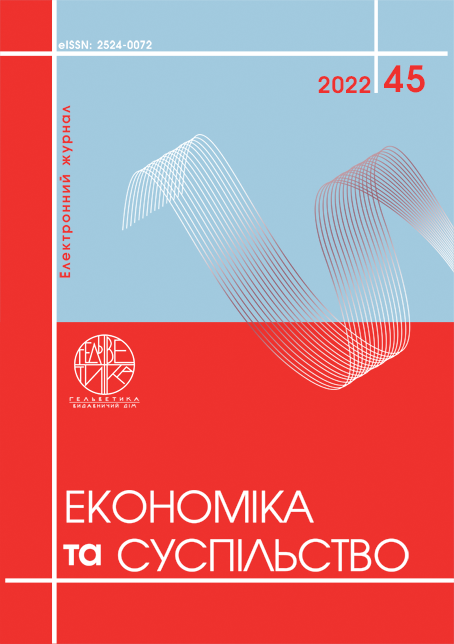ACCOUNTING OF DEFERRED REVENUE IN NON-BUDGET NON-PROFIT ORGANIZATIONS
Abstract
In recent years, the non-commercial sector of the economy has been actively developing in Ukraine, which is a set of non-budget non-profit organizations whose purpose of creation and operation is not to make a profit, but to have a social effect. The effectiveness of the management of a non-budget non-profit organization depends on the correct construction of the accounting system, which takes into account the peculiarities of the activities of such organizations. Inconsistency in the accounting methodology of various non-budget non-profit organizations leads to an incorrect assessment of their performance and future potential. The sphere of operation of non-budget non-profit organizations determines the occurrence of specific incomes, for example, targeted funding, deferred revenue, etc. Since the financial result for non-budget non-profit organizations is not the determining goal of their operation, the interpretation of the deferred revenue is not based on their influence on the indicators of profit or loss of another period, but on compliance with the principle of matching income and expenses. The nomenclature of deferred revenue of non-profit organizations will differ to some extent, and also depend on the specific type of non-budget non-profit organizations. Target financing received as non-current assets or used for the purchase of non-current assets can be reflected in the accounting in two ways: either with a reflection on the accounts of the target financing and write-off of such expenses at the time of accrual of depreciation, or on the account of deferred revenue immediately after the introduction of such an object into exploitation Another important aspect of the accounting display of deferred revenue is the heterogeneity of their composition. The analysis of the composition of deferred revenue allows us to distinguish two groups: deferred revenue that will be distributed within 12 months from the balance sheet date (current) and deferred revenue that will be distributed later than 12 months from the balance sheet date (long-term). Recognition and reflection in accounting of deferred revenue allows to withdraw spent funds from the amounts of received targeted funding and enables external and internal users to fully assess the organization's financial condition and directions of funding use.
References
Тростянська К.М., Крижановська О.А. Проблемні питання бухгалтерського обліку неприбуткових організацій. Вісник Хмельницького національного університету. Економічні науки. 2021. № 2. С. 184–189.
Толмачова А.М. Основи формування облікової політики неприбуткових організацій. Науковий вісник Ужгородського університету. Серія Економіка. 2018. Випуск 1 (51). С. 463–467.
Слободян Н.Я. Актуальні питання організації обліку доходів майбутніх періодів. Актуальні проблеми економічного та соціального розвитку підприємств харчової промисловості : матеріали Міжнародної науково-практичної конференції (21-22 квітня 2016 р., м. Київ). С. 36–38.
Куцик П.О. Проблемні аспекти обліку, аналізу та контролю витрат і доходів майбутніх періодів. Теоретико-методологічні і науково-практичні засади інвестиційного, фінансового та облікового забезпечення розвитку економіки. Матеріали міжнародної науково-практичної Інтернет-конференції (15-16 листопада 2011, м. Кам’янець-Подільський). Ч. 2. С. 199–202.
Гура Н. Методологічні засади бухгалтерського обліку в неприбуткових небюджетних організаціях. Бухгалтерський облік і аудит. 2012. № 9. С. 3–9.
Ковтуненко Ю.В., Боярська А.Д., Заплетнюк Д.К. Сучасний підхід до організації обліку доходів і витрат майбутніх періодів в аналізі фінансово-господарської діяльності підприємства. Економіка і суспільство. 2017. № 10. С. 754–760.
Куцик П.О., Ясінська Л.Т., Куценко Н.В. Внутрішньогосподарський контроль витрат і доходів майбутніх періодів: організація, методика. Вісник Львівської комерційної академії. 2011. Вип. 36. С. 219–224.
Малахова А.В., Поклонська М.Д. Організаційні аспекти обліку доходів майбутніх періодів. Актуальні питання психології, економіки та управління : збірка тез доповідей Всеукраїнської науково-практичної конференції (17-19 травня 2017 року, Слов’янськ). С. 39–41.
Trostianska, K.M., Kryzhanovska, O.A. (2021). Problemni pytannia bukhhalterskoho obliku neprybutkovykh orhanizatsii [Problem issues of accounting of non-profit organizations]. Visnyk Khmelnytskoho natsionalnoho universytetu. Ekonomichni nauky – Bulletin of the Khmelnytskyi National University. Economic sciences, 2, 184–189 [in Ukrainian].
Tolmachova, A.M. (2018). Osnovy formuvannia oblikovoi polityky neprybutkovykh orhanizatsii [Basics of forming the accounting policy of non-profit organizations]. Naukovyi visnyk Uzhhorodskoho universytetu. Seriia Ekonomika – Scientific Bulletin of Uzhhorod University. Economy series, 1(51), 463–467 [in Ukrainian].
Slobodian, N.Ia. (2016). Aktualni pytannia orhanizatsii obliku dokhodiv maibutnikh periodiv [Current issues of the organization of accounting of income for future periods.]. Aktualni problemy ekonomichnoho ta sotsialnoho rozvytku pidpryiemstv kharchovoi promyslovosti: materialy Mizhnarodnoi naukovo-praktychnoi konferentsii – Materials of the International Scientific and Practical Conference (April 21-22, Kyiv), 36–38 [in Ukrainian].
Kutsyk, P.O. (2011). Problemni aspekty obliku, analizu ta kontroliu vytrat i dokhodiv maibutnikh periodiv [Problematic aspects of accounting, analysis and control of expenses and income of future periods]. Teoretyko-metodolohichni i naukovo-praktychni zasady investytsiinoho, finansovoho ta oblikovoho zabezpechennia rozvytku ekonomiky: Materialy mizhnarodnoi naukovo-praktychnoi Internet-konferentsii – Materials of the international scientific and practical Internet conference (November 15-16, Kamianets-Podilskyi), P. 2, 199–202 [in Ukrainian].
Hura, N. (2012). Metodolohichni zasady bukhhalterskoho obliku v neprybutkovykh nebiudzhetnykh orhanizatsiiakh [Methodological Principles of Accounting in Non-profit Non-budget Organizations]. Bukhhalterskyi oblik i audyt – Accounting and Auditing, 9, 3–9 [in Ukrainian].
Kovtunenko, Y.V., Boyarsky, A.D., Zapletniuk, D.К. (2017). Suchasnyi pidkhid do orhanizatsii obliku dokhodiv i vytrat maibutnikh periodiv v analizi finansovo-hospodarskoi diialnosti pidpryiemstva [Modern approach to the organization of income accounting and expenditures of future periods in the analysis of the financial and economic activity of the enterprise]. Ekonomika i suspilstvo – Economy and society, 10, 754–760 [in Ukrainian].
Kutsyk, P.O., Yasinska, L.T., Kutsenko, N.V. (2011). Vnutrishnohospodarskyi kontrol vytrat i dokhodiv maibutnikh periodiv: orhanizatsiia, metodyka [Internal control deffered expenses and revenue: organization, method]. Visnyk Lvivskoi komertsiinoi akademii – Bulletin of the Lviv Commercial Academy, 36, 219–224 [in Ukrainian].
Malakhova, A.V., Poklonska, M.D. (2017) Orhanizatsiini aspekty obliku dokhodiv maibutnikh periodiv [Organizational aspects of future income accounting]. Aktualni pytannia psykholohii, ekonomiky ta upravlinnia: zbirka tez dopovidei Vseukrainskoi naukovo-praktychnoi konferentsii – collection of abstracts of reports of the All-Ukrainian Scientific and Practical Conference (May 17-19, Slovyansk), 39–41 [in Ukrainian].


